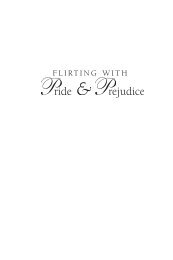Edited by Scott Westerfeld - Teen Libris
Edited by Scott Westerfeld - Teen Libris
Edited by Scott Westerfeld - Teen Libris
You also want an ePaper? Increase the reach of your titles
YUMPU automatically turns print PDFs into web optimized ePapers that Google loves.
Introduction<br />
HIS DARK MATERIALS AND THE IDEA OF NORTH<br />
Here’s a secret about us writers:<br />
Many of us dread the question, “Where do you get your ideas?”<br />
It’s just too complicated to answer, and at the same time too simpleboth<br />
silly and sublime. I’ve probably been asked it a thousand times, and<br />
yet I still don’t have a real response.<br />
Phillip Pullman has also admitted difficulty with the question. Not<br />
only with answering it, but with why anyone would ask. As he puts it:<br />
“I can’t believe that everyone isn’t having ideas all the time.”<br />
Now that answer makes sense, at least in Pullman’s case. He’s got more<br />
ideas than most of us.<br />
As this anthology began to take shape, one complaint became constant<br />
among the contributors: Pullman had provided them with an embarrassment<br />
of riches. Or perhaps a confusion of riches. His Dark Materials simply<br />
contained too many ideas. There were talking bears to be wrangled,<br />
poetic allusions to analyze, and a canvas that stretched across “ten million<br />
other worlds . . . as close as a heartbeat” (TGC 164-165). And on<br />
top of that, the characters’ souls were flitting around outside their bodies.<br />
Where was the humble essayist to start?<br />
As Maureen Johnson fumes within these pages: “His Dark Materials is<br />
a kind of symbol scrap yard. . . . There are even symbols imprinted on<br />
symbols (the golden compass itself).” And just as with the alethiometer,<br />
the symbols are layered with meanings that change every time the needle<br />
stops.<br />
Luckily, our intrepid essayists weren’t dissuaded <strong>by</strong> this multitude of<br />
ideas. As you will read, they’ve plunged into the scrap yard boldly and<br />
with scintillating results. But perhaps it should be unsurprising that<br />
even when the needle stops in the same place, the answers change. For<br />
example, our three essays about dæmons conclude that:<br />
1) We might one day have our own dæmons to talk to.<br />
2) We wouldn’t really want to have dæmons if we could.<br />
3) We already have dæmons here in our own world.<br />
1



